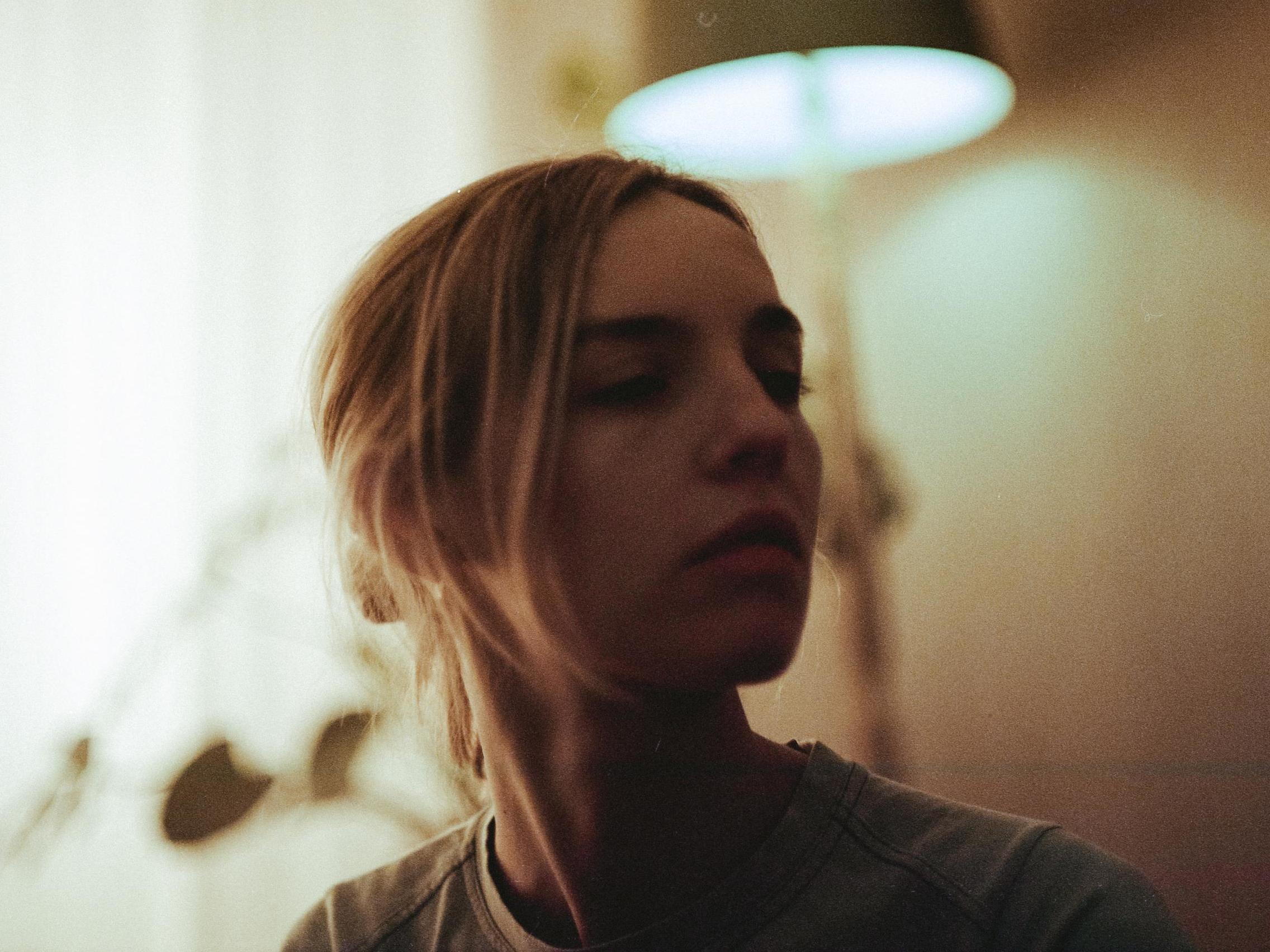The Japanese House interview: ‘If people think I’m using my sexuality, then so be it. Let’s f**king use it’
Amber Bain speaks to Alexandra Pollard about debut album Good at Falling, her break-up with musician Marika Hackman and why she feels like she needs to be 'chained to a wall' to stop herself from drinking


Your support helps us to tell the story
From reproductive rights to climate change to Big Tech, The Independent is on the ground when the story is developing. Whether it's investigating the financials of Elon Musk's pro-Trump PAC or producing our latest documentary, 'The A Word', which shines a light on the American women fighting for reproductive rights, we know how important it is to parse out the facts from the messaging.
At such a critical moment in US history, we need reporters on the ground. Your donation allows us to keep sending journalists to speak to both sides of the story.
The Independent is trusted by Americans across the entire political spectrum. And unlike many other quality news outlets, we choose not to lock Americans out of our reporting and analysis with paywalls. We believe quality journalism should be available to everyone, paid for by those who can afford it.
Your support makes all the difference.Of all the ways to get over a breakup, adopting a German shepherd puppy is a fairly unusual one. But that’s what Amber Bain, AKA The Japanese House, did last year when her four-year relationship with fellow musician Marika Hackman ended.
“It was so stupid,” says the 23-year-old, as we walk Calvin – the big, boisterous result of that decision – around London Fields. “I literally went away for a couple of weeks after we broke up, because we were living together, and then I came back with a dog, and we had to live together for another month. I was like, ‘Yeah, sorry, I’ve got a German shepherd’. But it definitely delayed my depression by quite a lot.”
Calvin is certainly an effective distraction – even from our interview. “He’s going through some weird teenage boy phase,” says Bain, as he careers over to a toddler, then a man attempting to do yoga, and then a prim, alarmed woman with three tiny dogs on leads. But as with all attempts to fast-forward the pain of heartbreak, the Calvin diversion only worked for so long.
“When it did hit,” says Bain, “it was quite intense. I had to give Calvin to my dad for a couple of weeks because I was like, ‘I actually physically can’t do this. I can’t.’ I broke down. I think I had a full breakdown.”
Bain is surprisingly candid for someone who spent the early part of her career shrouded in mystery – with enigmatic artwork, no press shots, and a vague, gender-neutral moniker. She was so mysterious, in fact, that many believed her to be a secret side-project of The 1975’s Matt Healy. The music, after all, with its layered vocals, reverb-filled guitars and snatches of kaleidoscopic samples, was not dissimilar to The 1975’s. And the voice was androgynous enough that it could have belonged to anyone.
None of this was particularly intentional. Bain – who’s from Buckinghamshire – just didn’t like having her picture taken, and had named herself The Japanese House after a Cornwall holiday home she stayed in as a kid, during which she pretended to be a boy called Danny and successfully wooed the girl next door. But when she released Pools to Bathe In, her debut EP from 2015, the intrigue around her backstory only added to the hype.
Four years later, The Japanese House’s elaborate musical DNA remains the same (if a little tighter, the melodies more potent), but the mystery has dissipated. At times on her debut album Good at Falling, she is positively blunt. “We don’t f**k any more,” she sings on “We Talk All the Time”, as vocals layered up like a church organ give way to a fusillade of staccato beats. “But we talk all the time, so it’s fine.” The song is a flinch disguised as a shrug.
“Most of the songs were written before the breakup, which is weird because it does sound like a breakup record,” says Bain, as we settle on the floor beneath the shade of a tree. “I’ve analysed them retrospectively, and it feels like they’re about a breakup, but at the time, I wasn’t thinking, ‘I wanna break up with Marika’. I guess I was breaking up with a portion of myself as well. And that’s really hard to do. A lot of like, issues that I had… I had loads of anger and lots of weird stuff, like drinking and drug taking.”
Bain gave up drinking after the breakup. “That really helped,” she says. “I didn’t realise how much I needed to stop drinking until after I’d stopped. It came to a point where I was like, ‘Why the f**k would I drink?’ I couldn’t understand why people were doing it. You become quite self-righteous and sanctimonious, because you’re like, ‘God, I’m such a better person than all of you. You’re all idiots, you’re all stuck in the cycle of intoxicating your bodies, because you all feel awkward. Show some f**king decorum!’ But then, yeah, then I started again, so...”
She “slipped up” a month ago, and hasn’t yet managed to stop again. “I’m really pissed off with myself actually,” she says, pulling up the grass around her, “but whatever.” Has the drinking at least become less full-on? “Maybe more full-on,” she says. “And I’m also on this medication which I’m not allowed to drink on, because it f**ks up your liver, and with alcohol it can be really toxic and life-threatening. But that’s how dumb I am. I did it anyway. I just convince myself I’ll be fine. I mean, who knows what damage I’ve done? Sometimes I’m like, ‘Will it literally take me having to have a serious health condition where I cannot drink or I will die for me to stop drinking? What do I need to do?’ Sometimes I feel like I need to be chained to a wall.” She speaks so blithely, it’s only afterwards that I register quite how dark her words are. She pulls off the same feat with her music, where desolate lyrics often lurk beneath bright, buoyant soundscapes.
One song on the album, “Everybody Hates Me”, is about the “thousands” of mornings Bain woke up regretting her drunken actions the night before. “My girlfriend would be sleeping on the sofa,” she recalls. “I’d be like, ‘I’m so alone’. It’s just a reminder that you think you’re in these partnerships that really mean something. But whether they fall asleep, or they leave you, or they cheat on you, or you fall out of love with them, whatever happens, they’re actually so f**king... what’s the right word? Fragile. And brittle. When someone’s asleep, it’s just a massive reminder of that, that you’re totally alone.” There’s a pause. “Urgh. It makes me feel sick. I hate the idea that we’re all alone, but I really think we are.”
She’s aware how despondent she’s sounding. And she’s aware, too, that her dad reads every interview she does. “He always hears me saying these things and he’s like, ‘But you have me!’ I’m like, ‘Yeah but you’re gonna die.’” She starts to laugh. “Surely I should be trying to... But then maybe I’ll die. Who knows what’ll actually happen, but most of the time your parents die, so even the unbreakable bond between father and daughter is broken...” Her voice drops to a dramatic whisper. “By death.”

Bain’s honesty might be raising her dad’s blood pressure, but she is clearly either unwilling, or unable, to censor herself. Those enigmatic beginnings could never have lasted. There is one thing, though, that she did consider hiding for a moment: her sexuality. “I remember asking someone from my label, ‘Shall I tell them that I’m in a relationship with a girl? Or shall I keep it secret?’ And them being like, ‘It’s completely up to you.’”
She decided to stick with female pronouns in her lyrics, but in the video for 2016 single “Face Like Thunder”, she cast a male actor to star alongside her. “I purposely chose a boy to be in it not a girl, because I was like, ‘I don’t wanna jump on the lesbian bandwagon’, blah blah blah’,” she says. “It was stupid.” These days, she doesn’t care. “I literally don’t even think about it,” she says. If people think that I’m using it, then so be it. Let’s f**king use it.”
Suddenly, she can’t see Calvin any more. “Where’s he actually gone? Calvin! Oh my god, CALVIN!” He bounds out from behind a tree. It’s stressful, she says with a relieved chuckle, being an “anxious parent”. But she’s endlessly grateful for him. “It’s probably a much smaller version of how Lorelai Gilmore feels about having Rory Gilmore,” she says, referring to the Noughties comedy drama series Gilmore Girls. “It was really dumb and stupid, but she’s still overall very happy that she had her. I’m so happy that I have him. CALVIN!”
The Japanese House’s debut album, Good at Falling, is out now.
Join our commenting forum
Join thought-provoking conversations, follow other Independent readers and see their replies
Comments